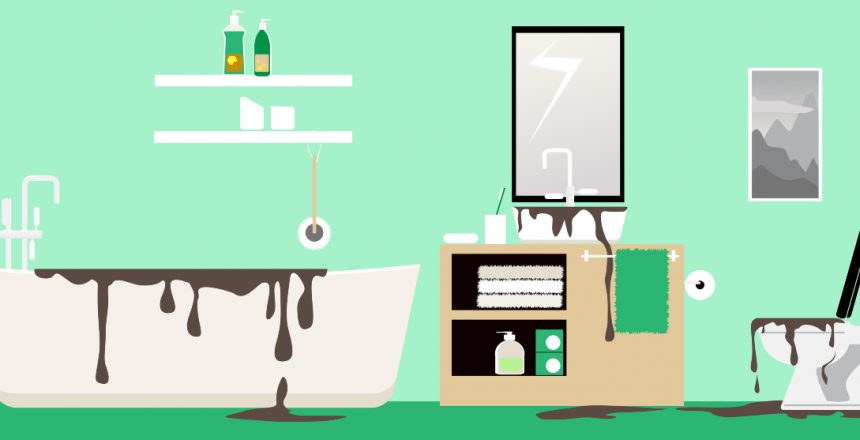A sewage backup is a nasty problem to have to clean up. It disrupts a lot of daily tasks, is hazardous to your health, and can be quite damaging to your home and belongings.
If you’re experiencing a sewage backup, you need to deal with it swiftly before it causes more damage or begins to cause health problems to you or your family.
What to do after a sewage backup
Before trying to diagnose the cause of the backup, there are a few things you should do first:
- Get children, pets, and other family members away from the area
- Shut off your electricity, gas, and water
- Ventilate the area
- Call your insurance company
- You can pour small amounts of bleach in the standing water for disinfection
After this, the best thing to do is contact a sewage backup professional to help you quickly extract sewage and wastewater, address the cause, and restore the affected areas of your home.
Contacting a professional is especially recommended if the backup is happening in more than one room of your home, the backup occurred more than 24 hours ago, there are members of your family with health complications, or if the backup was caused by a sewer or septic tank.
How to clean up after a sewage backup
Again, we highly recommend going with a professional for a sewer backup. However, if you’re adamant about doing it yourself here are some guidelines:
- Suit up in rubber gloves and boots, protective glasses, and a facemask
- Begin removing sewage water as soon as you can with a wet vac
- You can shovel solids and semi-solids into plastic bags
- Discard anything that is porous or permeable
- Non-porous materials can usually be cleaned and disinfected if you’ve started cleanup within a few hours of the backup
- Carpeting, wall paneling, baseboards, and insulation that has been soaked need removed
- Wash all walls, floors, surfaces, and other affected areas or items with bactericidal disinfectants
- Deep-clean those same surfaces or items again with detergent and water
- Floors should be cleaned with one part bleach and four parts water and rinsed with water
- After removing excess water and cleaning up, either air dry or run dehumidifiers and your AC continuously until you’re absolutely certain the area is fully dry
- Keep an eye on the area to make sure there is no mold growth
- Have any appliances, plumbing, or electrical systems inspected
What causes a sewage backup
Typically one of two things causes a sewage backup. Either you have a blockage somewhere in your plumbing or there’s too much wastewater for it to handle.
Blockages could be caused by anything but a common mistake homeowners make is flushing substances they shouldn’t such as fats or oils that coagulate or solidify. Wipes that don’t break down after flushing are another common cause.
Even if you have a septic system instead of a connection to a sewer, the same problems hold true for you.
A period of heavy rainfall can also fill a sewer system so full that it forces water and/or raw sewage up and out of your home’s plumbing.
If your home has an effluent pump, obviously a failure of the pump can also cause a backup. Often, there is an alarm or a red light that will let you know if your pump has failed.
How to prevent a sewage backup
As you can see, there’s several causes of a sewage backup that are preventable. Proper disposal of fats, oils, and household items prevents the most common causes of a sewage backup.
For natural causes of sewer backups, you can install a backwater valve between your house and the sewer main. This will only allow wastewater to flow in one direction, stopping backups caused by something downstream of the valve.
Call a professional immediately after a sewer backup
As we’ve stated several times, our best advice for a sewer backup is to contact a professional to diagnose, clean up, and address it. This is the most effective way to avoid as much damage and health risks as possible.
Mold and Water Guys have vast experience in sewage backups and in restoring households following catastrophic water, mold, and sewer damage.
Give us a call at 417-885-9493 if you’re experiencing a sewer backup!
